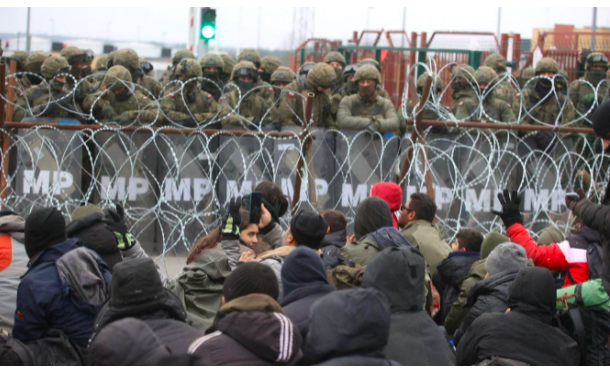Geo-Political Blame Game: The Belarus-EU border migration crisis
Posted on : December 21, 2021Author : Ankita Chatterjee

A simmering border crisis along the European Union’s frontiers with Belarus has been brewing for many months now. With thousands of migrants living in tent villages in cold and rain-drenched forest on the Belarusian border with Poland, hoping to make their way to the EU through Poland for a better life, this emerging crisis has morphed into a serious geopolitical dispute, garnering international attention.
Since November, there has been a sharp uptick in the number of refugees and migrants, mostly from the Middle east, heading to the Belarus-Poland border in the hope of crossing into the European Union. But those trying to leave Belarus have been denied entry to Poland, with a forbidding barbed wire fence and masses of security forces deployed by Warsaw barring their way. Stuck in freezing temperatures without access to vital supplies or medical care, the migrants are oscillating between Belarusian soldiers encouraging them to enter Poland and Polish soldiers pushing them back to Belarus.
This migration turbulence is being largely orchestrated by Aleksandr Lukashenko, Belarus’s autocratic ruler, to induce trouble for the European Union in a furious retaliation for a series of EU sanctions against his government. Through the sanctions, the bloc sought to punish Minsk over its forced diversion of a passenger jet in the month of May this year and the subsequent arrest of a dissident journalist, Roman Protasevich, who was on board. The EU, calling it air piracy, barred Belarusian carriers from using its skies and cut imports of the country’s top commodities. Moreover, months earlier, the EU and the United States penalised Lukashenko’s government for cracking down on renegade after a disputed August 2020 election which perpetuated the Belarusian President’s rule and provoked mass anti-government protests. Infuriated by the toughened measures, Lukashenko hit back by announcing Belarus would no longer try to prevent undocumented migrants and refugees from reaching the EU, arguing the bloc’s sanctions deprived his government of the funds needed to do so. Since then, EU member states bordering Belarus, including Lithuania, Latvia and Poland, have reported sharp increases in the number of people attempting to cross their borders. The EU accuses Minsk of deliberately enticing migrants and refugees to Belarus by relaxing the visa rules and hence, creating a humanitarian crisis by encouraging movement westwards with promises of easy entry into the bloc as part of a “hybrid attack” on its rival member states in retaliation for sanctions. Lukashenko, denying the allegation, sought to shift the blame on the West instead by suggesting the migrants would be fine if only the EU would accept them.
The stand-off at Poland’s border with Belarus has developed into a public relations battle, as the countries blame each other for the plight of migrants trapped in the middle. Belarus is under pressure from the EU, US and organisations, such as the G7 and NATO, but sees Russia as a key ally and creditor. Now Russia is being accused by Poland as the mastermind behind the crisis but Moscow has denied involvement and has sought to shift blame on to the West as well. It has accused Poland and its fellow EU members of attempting to “strangle” Belarus, which Russia sees as a security buffer against the bloc and the US-headed transatlantic NATO military alliance on its western flank. Poland, on the other hand, considers the crisis as a blitz on the EU and suspects Belarus of using text messages to shepherd migrants towards the EU’s eastern border while coaching them to deliberately look forlorn and miserable. Meanwhile as the tossing of blame continues, the migrants continue to suffer.
Moreover, social media has also played its part to exacerbate the crisis. Sensing a lucrative business opportunity when Belarus relaxed visa policies for certain countries, notably Iraq, travel companies in Iraq’s Kurdistan Region started advertising on Facebook and other platforms about the availability of visas to Belarus. Smugglers used social media to pitch Belarus as an easy back door to Europe and thereby, to profit off the desperate people. A research by Semantic Visions revealed that since July, dozens of groups have been created on Facebook as well on Telegram sharing information about migration routes to Europe, with smugglers openly advertising their services online. Fake videos were also circulated claiming that Poland was about to open its border and urging all those who wanted to enter the European Union to gather at a gas station near the border. All these elements in some way stoked the fire of the crisis.
The migrants apparently dream of making their way to Germany through Poland. Both Warsaw and Berlin circulated messages on social media, addressed to the migrants, in Kurdish, Arabic and English to persuade them that this could not be an option. Ministers from G7 countries came to Poland’s defence against what they said were Belarus’s breaches of international law by “weaponizing migrants” in order to create instability within the EU.
Human rights groups and global bodies have raised concerns for their wellbeing, pointing to a spate of reported deaths, including a child, on both sides of the border as evidence of the treacherous conditions they face as winter sets in. They have also raised concerns over asylum seeker pushbacks by Lithuanian and Polish border guards, as well as denial of basic provisions such as food, water and shelter for the migrants. Poland has been additionally criticized for not allowing journalists, doctors and NGOs to the border as the Polish government has imposed a state of emergency that prevents aid from reaching those trapped in the border area. Equally, Human Rights Watch and a meeting of the UNSC in November condemned the orchestrated instrumentalization of human beings by Belarus for political purposes with the objective of destabilizing neighboring countries. The EU is weighing whether to impose more sanctions against Minsk in response to the border crisis. However, Belarus continues to deny engineering the crisis and warns it cannot help bring it to an end unless the earlier penalties imposed on Lukashenko’s government are lifted.
The blame game does not seem to cease but it is highly probable for this humanitarian crisis to go on for months as Poland, with EU backing, is determined not to let the migrants in. The UN Human Rights Council has urged all parties to respect human rights of the refugees and refrain from using them for political ends. There have also been calls from other organizations for a human rights-centred response based on solidarity and European values and standards.
References
1] “Poland-Belarus border: What you need to know about the crisis”, Al Jazeera , 12 Nov 2021
2 ]Henry Ridgwell, ‘Pingpong Pushbacks’: Winter Misery for Migrants Trapped on Poland-Belarus Border”, Voa news, November 24, 2021
3] Tim Stickings “Belarus blame game: What the key players are saying on border crisis
”, The National News, Nov 19, 2021
4] Paul Adams and Joshua Nevett, ”Poland-Belarus: How social media posts fuelled the migrant crisis”, BBC, November 11, 2021.
https://www.bbc.com/news/world-europe-59253377
5] Andre Roth, “Poland-Belarus border crisis: what is going on and who is to blame?”, The Guardian, November 9 2021.
https://www.theguardian.com/world/2021/nov/09/poland-belarus-border-crisis-migrants-eu-explainer
Ankita Chatterjee
Intern, Asia in Global Affairs





Leave a Reply